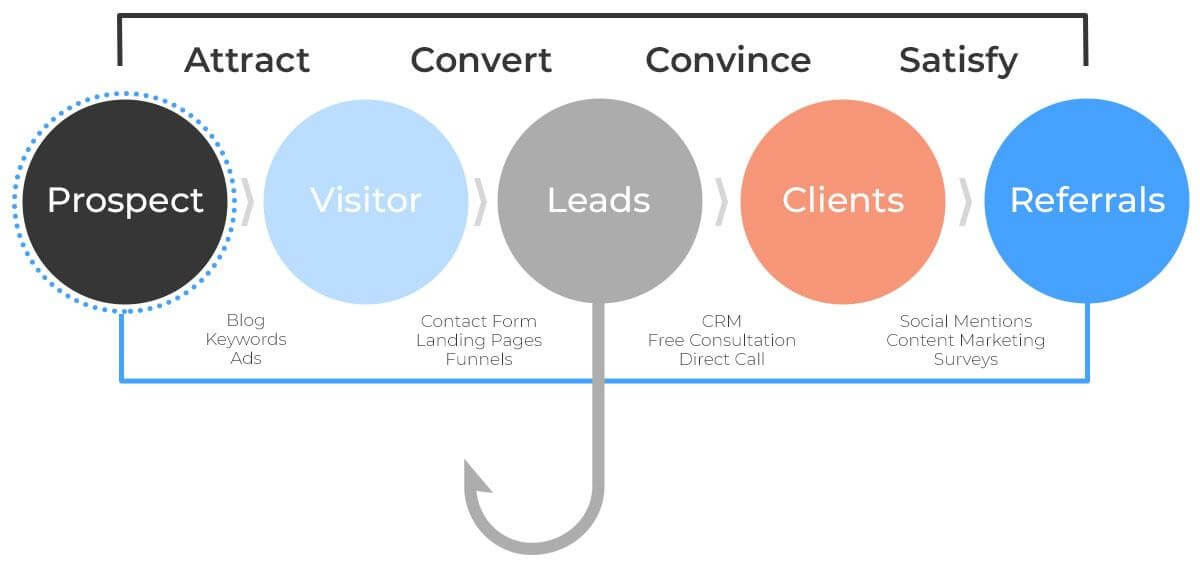You might think the purpose of your lawyer website is to provide information about your law firm’s legal services or a place where people can request a consultation. While these may be the primary objectives, there are a few things you must do before the phones start ringing.
From a digital marketing point of view, lead generation is a popular term you should understand. When you’re looking for potential clients for your firm, driving the right traffic to your website is the first step then turning those visitors into clients is the next.
If you’ve been wondering how to get more leads at your law firm, perhaps this will help you out.
What is Lead Generation?
Perhaps you’re new to owning a website and you’re just getting into all the technical language that comes along. Here’s a quick overview of common words used in online marketing:
- Traffic refers to the number of visitors to your website which can either be real people or bots. You can see this if your website connected to a tool like Google Analytics. Once installed, you’ll be able to track both web visitors and the number of page visits.
- Lead Generation is the process of curating or collecting prospective client’s contact information and taking them as clients.
- Landing/Squeeze Page can be used to send web traffic to a specific web page to offer valuable content in exchange for their contact information. Alternatively, you can offer a special promotion (i.e. free consultation) which can only be found on this page.
- Sales Funnel is a series of steps that takes leads through the process of becoming a new client at your firm. From a lawyer’s perspective, you use various strategies to market and bring in new clients (i.e. drip marketing).
- Conversion Optimization is a process of increasing the percentage of visitors to your website and converting them into a new client.
Perhaps you can start to see that there are various angles you can take when it comes to marketing your law firm’s website. The essentials include web traffic to generate leads and a landing page to collect them. As well, you’ll have to perform ongoing site analysis to find new ways to turn more visitors into clients at your firm (maybe changing some of the colors on your website will work).
This will likely be an ongoing process for your online marketing strategy. In the meantime, let’s explore how you can improve you lead generation at your law firm.
More Leads. More Clients.
When you’re considering a lead generation strategy for your law firm, you want to ask yourself these kinds of questions:
- What kind of clients do I want?
- Where can I find these clients on the web?
- How can I attract these clients to my firm?
- Lead generation for lawyers. How do I generate leads?
By addressing these questions, you can start to develop your own methods to finding clients that you prefer to work with. Remember, this is your business which means you ultimately decide which types of clients you choose to work with or not.
What Kind of Clients Do You Want?
Let’s start here. Do you even know what kind of clients you prefer working with?
You probably don’t enjoy taking on clients that add more stress and more work than is needed. Perhaps if you’re in a desperate situation, you may accept these clients because you need the cash. But, you know if you continue doing so, you’re going to burn out.
Instead, take a moment to determine who you enjoy working with and what specific cases you handle best.
If you’re depending on the internet to find almost all of your clients, you have to be prepared that people are going to be “shopping around” for the lowest rates. Nonetheless, that’s not to say you can’t find quality clients online, it’ll just take a bit of effort and testing to find.
Now, before you keep reading, ask yourself this: was there ever a client you would rather not work with?
Where Will You Find Your Clients?
Your prospective clients are likely a few clicks away from stepping into your office to get their legal struggles solved.
You should be aware that search engines receive a lot of queries from people looking for solutions to their legal problems. Some common search entries may be:
- [Lawyer Type] + [Location]
- [Lawyer Type] + Fees
- Cheap/Affordable Lawyers + [Location]
Often, you can design your website in a way to attract these searcher to your website. This is the process of SEO and you can find more information about that kind of strategy for your law firm here.
Knowing where your clients are spending much of their time online can be difficult if you’re not familiar with the web. However, social media (i.e. Facebook, Instagram, LinkedIn), are great places to start targeting specific groups of people who may be in need of your legal expertise.
Ideally, you should have your website listed on as many local directories as possible as well as search around to find niche locations where people may be search for a lawyer.
For the solo lawyer doing all the marketing yourself, you may want to consider these marketing ideas coming next (these ideas also apply to lawyers and law firms of any size).
How Will You Attract Those Clients?
Are you familiar with the term bounce rate? It wasn’t defined above however it refers to the amount of people who visit your website then leave right away.
This happens because the content or information on your website and landing pages aren’t fulfilling the need that people were looking for.
In order to attract more clients to your firm, you’ll have to test a few different strategies to see what works and discard what doesn’t work from your marketing methods. Here’s a few strategies you can consider to start generating more leads:
Strategy #1: Compelling Landing Pages
If you’re running a PPC campaign, you’ll want to make sure your marketing dollars are getting you the biggest return possible.
The best way to ensure you don’t waste all your money is making sure the keywords you use in your ads is congruent with the message on your landing page.
If you think of your website in terms of a sales funnel, consider offering a free consultation. As you run your ads, target the immediate needs of people thinking about divorce, those recently in a car accident, or a new business in need of copyright protection.
You should understand the fundamentals of keyword research to know which words people are using to serve better ads. As well, you should create ads that not only look good but remain consistent to the overall message.
Then, when people start are arriving to your landing page, use a strong and compelling message that gets them to sign up to an email list, send a message to your firm, or to call you right away.
Strategy #2: Helpful Videos
Are you Camera Shy? Hopefully, not.
Offering a helpful video, especially with your expertise in your area of practice, can allow you to make stronger connections and build better trust online.
Let’s face it, a few words on a screen may not be the icing on the cake when it comes to choosing a person who’s going to help a dire situation or prevent someone from going to jail.
Instead, videos allow you to reveal your personality and send a direct message to those considering a lawyer in their community. Take a look at this lawyer who takes a camera to his office and capturing his entire day:
Strategy #3: Offer Free Information
You’ll see this strategy used a lot of online services. They create a free piece of valuable content, host it on their website, then give it away for free in exchange for someone’s contact information.
As a lawyer, you know there’s all kind of questions people have about their legal situations. For example:
- Those going through divorce want to know what rights they have, the risks involved, and the possible outcomes to their situation if they and their spouse can’t come to an agreement.
- In the business world, copyright infringement can ruin a business. People want to know how they can protect their creative intelligence and what kind of legal action they can take if their ideas are stolen.
- Some people experiencing a traumatic event may not know what actions to take in their situation.
This list can go on and on, however, the point here is to create some valuable content that addresses these common concerns. Consider creating a short ebook that addresses them and creating a dedicated landing page to make the exchange.
You can then follow the same idea from above where you use the emails collected to send more content, offers, and information about your legal services.
Quick Warning About Lead Generation
If you ever consider hiring someone to help with your lead generation, there are a few things you should consider before you do. These services may offer pay-per-lead or pay-per-click vendors. However, you have to watch out because you can get a lot of leads (i.e. emails, phone numbers, etc.) but they may not be interested in your business.
In case you want to go ahead and use these services, consider these lawyer specific pay-per-lead services:
Please do your own due diligence before using any of these services. We do not endorse nor receive payment from these services. These are just a few of the available PPC and PPL services you can use for your firm. Results will very and should always be measured for cost effectiveness.












 6. Bankruptcy Law
6. Bankruptcy Law



















 PracticePanther
PracticePanther

